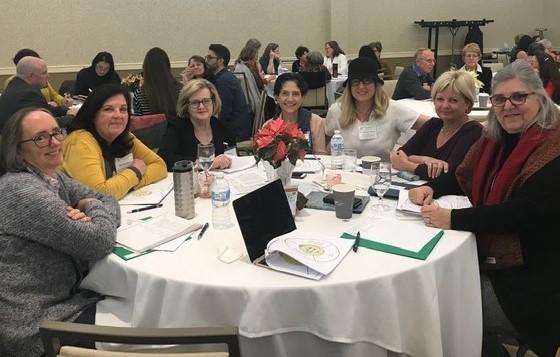
From left to right: Elaine Glier (CGMS IT Practicum Coordinator), Martha Carver (CGMS CO-Director of the new School Leadership program), Cathy Carpenter (Instructor for the Institute of Advanced Montessori Studies), Tanya Ryskind (CGMS EL IG), Jana Morgan Herman (CGMS EC IG), Kathy Leitch (CGMS IT Director, Co-Director CGMS School Leadership program, Ex. Director, IMC), and Kitty Bravo (CGMS Director of Education). Also attending but not in photo, Jocelyn Swanson (CGMS Secondary Director) and Mercedes Castle (CGMS IT IG).
Several CGMS faculty members attended the Seventh Symposium of the Montessori Accreditation Council for Teacher Education (MACTE) in Charlottesville, VA, December 5-7, 2019. The symposium brings together Montessori teacher educators from across the country and around the world. It is a great opportunity to learn and collaborate with other teacher educator and focus on how we can better serve adult learners and as a result the children of the world.
The symposium began with a presentation by Angeline Lillard on how Montessori is validated by current research. Lillard shared research indicating the value of Montessori programs committed to high fidelity and that Montessori education supports the development of executive functions. She also noted that Montessori works because it is a holistic system. She listed the key components of the Montessori System as: developing self-determination by providing opportunities for children to work with peers, engaging in interesting work that is self- correcting and interconnecting, providing order and organization, intrinsic rewards, strong attention to executive function and the embodiment of cognition and a positive relationship with a teacher who provides warmth and direction.
Another presentation by Sara Robinson, director of a center for child and family crisis services focused on the effects of childhood trauma on learning and development. Ms. Robinson discussed the ACES assessment which measures adverse childhood experiences. She shared research showing that high ACE scores are directly connected to health and life challenges. Childhood trauma can have lasting repercussions disrupting brain development and neurological functioning, causing social, emotional and cognitive impairment, and leads to health risk behaviors that can last a lifetime causing ill health and serious life challenges. Most importantly, Robinson shared steps we can take to support children in the development of resilience; building relationships, building and mastering skills, and building community with resources and access to support.
Our faculty feel strongly that as compassionate educators we must learn more about trauma informed teaching. CGMS is committed to learning more and providing this information to our adult learners and graduates so we can all work together to support the children who need us the most.
The symposium also provided opportunities to better understand the value of accreditation with a presentation from a panel of accreditation specialist. This presentation highlighted the important role of accreditation and specifically MACTE accreditation has in assuring Montessori educators have opportunities for high quality teacher preparation courses leading to certification that is recognized worldwide.
The presentation from John Hunter on the World Peace Game was truly inspiring. Watch John’s Ted Talk to see why! Jon also shared a great activity to help us look at topics and issues from a variety of perspectives. It was fun and eye opening. We’ll be adding this activity to our residential and live class schedules.
One CGMS faculty member commented, “One of the big takeaways for me was that adult learners need to feel empowered around delivering parent ‘education’. Many AL’s come out of training without the confidence to educate parents in how to work together with schools in service of their child’s growth and development. Presenter, Martha Teien, gave us a great foundation for a parent ‘network’ curriculum that can be shared with our adult learners.”
The program ended with an afternoon of round table discussions. This provided a great opportunity to share ideas and tackle important topics with other Montessori teacher educators. Clearly the networking that happens between sessions and during meals and at these round table discussions is one of the most valuable things about this symposium. A good time was had by all. We learned and came away with a renewed commitment to support the next generation of Montessori educators and leaders.